7 people found this helpful

Your little one has reached the age of potty training and proudly mastered it – by day. That’s a milestone to celebrate (for both of you)! Now, it might be time to think about potty training at night, which comes with a few new challenges, but also brings – for you – the prospect of restful sleep, dare we say, all through the night.
It’s totally normal for night-time potty training to take a bit longer to get the hang of, but with our 5 tips on how to potty train at night, your little ones will soon stay dry till morning. And who knows – maybe the next time you find yourself awake in the wee hours (excuse the pun); it might just be to enjoy a peaceful bathroom break that’s just for you.
So, without further ado, read more about our 5 night-time potty-training tips:
- Wait until your little one is ready.
- Prepare in advance.
- Talk it through with them.
- Stick with what works for you.
- Keep calm and carry on!
Remember to be patient – potty training can be hard, and at night-time is no exception. But stick with us as we explore how to potty train at night and establish some healthy habits that will help keep little ones dry. And while you're teaching them, don’t forget – you’re carving out a little more freedom for yourself too. Fewer midnight accidents mean more moments just for you (even if it’s just a quiet toilet trip without an audience).
Day-time potty training vs night-time potty training
Do you wonder why your child is dry all day, but wets the bed at night? Children usually learn how to potty train during the day first, whereas potty training at night might take them a little bit longer.1
Here are some reasons why kids might find day-time potty training easier than night-time toilet training:
- Development of brain-bladder control. When you have a full bladder at night, it sends a signal to the brain that wakes you up. However, the brain-bladder control is not fully developed in children, and might not wake them up, especially when they’re deep sleepers. Instead, their pelvic floor muscles relax and empty while they sleep, causing bedwetting.2
- Smaller bladder capacity. Children have a smaller bladder capacity, that will increase from childhood to adulthood. Their smaller bladder capacity means that they might need to pee more often, and it can make it harder for them to stay dry through the night.2,3
So, if your little one has mastered potty training by day, but not by night quite yet, that’s completely normal!
However, if you’ve tried potty training your child for a while and they keep wetting the bed, or if they’ve started wetting the bed again after not doing it for a period of more than 6 months, it is recommended to see a GP, who will know how to advise.4 While bedwetting is common in children under the age of 5, it can also be caused by underlying health conditions such as constipation or diabetes, so it’s important to seek professional advice when in doubt.4
With that said, here are our top tips to potty train at night!
1. Wait until they’re ready for potty training at night
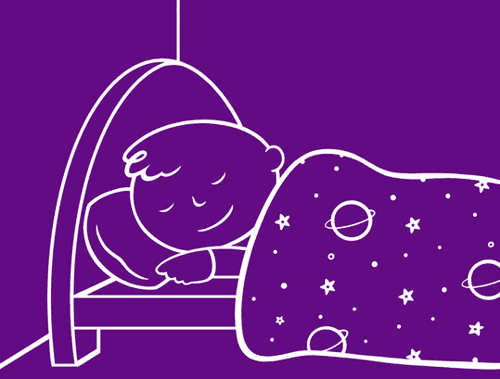
As with most aspects of your child’s development, they’ll take nighttime toilet training more easily if you wait until they’re ready. Here are some of the signs your little one is at the right stage to start toilet training at night:
- They ask to stop wearing night nappies
- When they wake they ask to go to the toilet
- Their nappy pants are dry for a few nights in a row
- Their night pants are only slightly damp in the morning
Dr. Isabelle Benard says : “Remember that boys usually take a bit longer than girls to achieve dry nights, which is perfectly normal. The majority of boys and girls achieve dry nights by the age of 3.5 or 4 years old, so be patient as everyone is different.”
2. Put simple preparations in place for night-time potty training
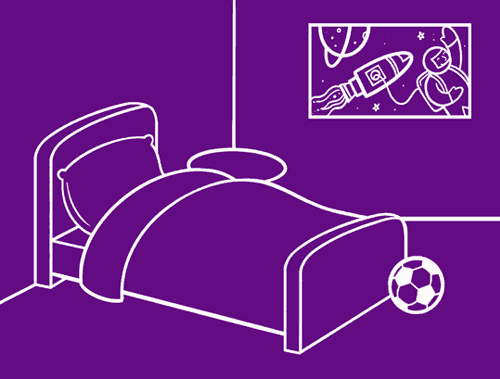
It’s worth doing a few things in advance to prepare for successful night potty training. Night-time toilet training will inevitably go more smoothly if you’ve thought ahead to potential pitfalls. You might like to try some of these tips for toilet training at night:
- Place a waterproof mattress protector on their bed
- Put a potty by their bed if the toilet is too far to get to in time
- Leave the landing light on, or add a nightlight, to illuminate their path to the bathroom
- Introduce a trip to the toilet to their bedtime routine
- Ask them to use the toilet as soon as they wake up in the morning
- Have some spare bedding and pyjamas ready for any accidents
Making habits out of small actions, like encouraging a morning loo trip or placing a potty within reach of the bed, can make a big difference when it comes to night-time potty-training success.
Because here’s the thing about habits: once they stick, they stick. And helping your little one take care of themselves without even thinking… helps you too. Less reminding, less midnight dashing for the cleaning supplies for those wet-bed cleanups. Less stress. And less of all that? Well, that means more peace, quieter, and more sleep – aaaaand relax.
Dr. Isabelle Benard says: “Try to be mindful of how much your child drinks in the two hours before their usual bedtime. Try and avoid giving them a large bottle or tall glass of water. Encourage them to drink more throughout the day and sip small amounts of water if they’re thirsty in the lead-up to bedtime. This will help reduce the amount of urine produced in the night, and hopefully any bedwetting.”
3. How to night-time potty train: Talk it through!
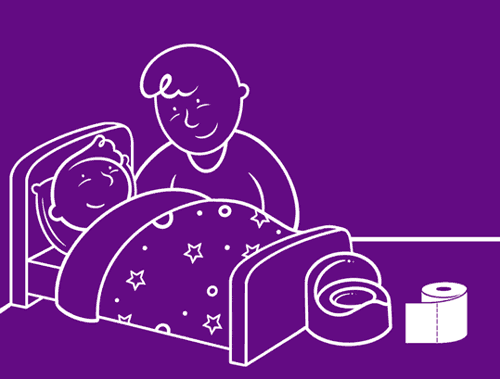
Make time to have lots of relaxed chats with your child just before you start potty training. Night-time toilet trips can seem daunting to little ones, so they’ll look to you for reassurance. They’ll also need to understand why they need to get out of bed when they need the toilet at night, and how it will work in practice. Offer lots of encouragement, and get older siblings to help with this too. The best cheerleader is always the older brother or sister they look up to.
Can they call you to help them? What should they do if they can’t see well enough? These are the kind of questions your child might have. It’s a great time to go over those hygiene rules they learnt while potty training by day, like wiping, flushing and washing their hands.
Make their night time toilet trips as comfy as possible by using a soft toilet paper like Cushelle Quilted now 50% longer lasting!
4. How to do potty training at night: See what works for you
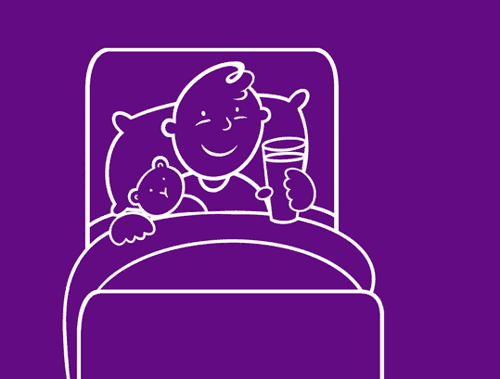
Different parents try different approaches to toilet training at night. Some swear by lifting deep sleepers for a ‘dream wee’ when they head up to bed, while others limit the amount of drink before bed. No two children are the same, and it’s all about what works best for your family. Try a variety of methods and you’ll soon settle on the most effective.
In the spirit of sharing and caring, consider involving other family members and friends – have open conversations about what strategies have worked for their little ones in the past, and be open to trying their suggestions.
And remember, the journey is as important as the destination, and embracing flexibility can make the experience less stressful for everyone involved. As you explore different methods to night-time potty training, keep in mind the comfort of your child during their toilet trips.
5. Our best tips for toilet training at night: Keep calm and carry on

Accidents are inevitable when potty training at night, even after it seems like your little one has got the hang of it. There’s no need to worry, though, as this is perfectly normal. Stay relaxed and calmly clear up. If they see that it’s no big deal, they’ll quickly get back to dry nights.
They’ll soon get the hang of night-time potty training and you can all congratulate yourselves on another milestone reached.
Dr. Isabelle Benard says: “Always remember, your child is not peeing at night on purpose – or to spite you! This happens without their control, so there is no reason to tell them off if there is an accident. When their nervous system is mature enough, they will achieve dry nights naturally. This can take time, so be patient and kind.”
So, if there's a little oopsie, don't stress. Keep things light, and you'll all get through it. Remember, this is all part of the night-time potty-training milestone. And before long, both you and your child will be sleeping soundly through the night. You’ve got this!
Sources:
1 NCT, Potty training at night
2 Urology Care Fondation, What is nocturnal enuresis (bedwetting)?
Related articles
Potty Training Tips: How to Potty Train a Boy
Want to know the best age to potty train a boy, or how potty training boys differs from girls? Read on for the essential potty-training tips for boys.
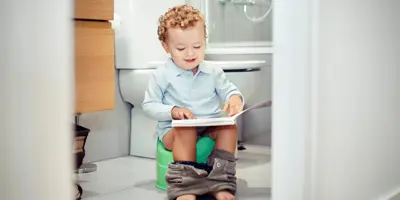
The potty-to-toilet transition: 7 essential toilet training tips
Do you think your child is ready to make the transition from potty to toilet? Read this guide for toilet training tips from the experts at Cushelle.
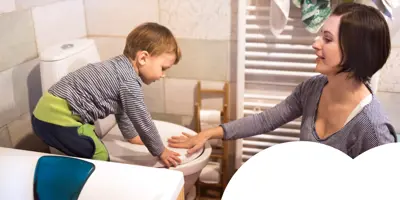
How (and When) to Do Potty Training
Potty training can be tricky, but a little patience and some smart parenting tricks can make all the difference. Find out how to potty train kids here!
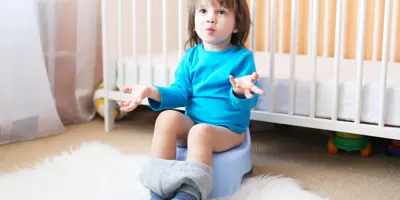
What's the Right Age to Start Potty Training?
Is there a 'good' age to potty train? Cushelle answers all your questions about how to know when your child is at potty-training age. Click for more.
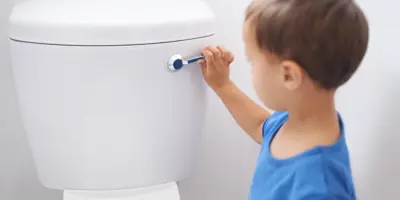
How to craft the perfect morning routine for school
Does your morning routine for school always end up in everyone leaving the house late? Read on for tips to help you to craft the perfect morning routine.

7 things that help with your baby's stuffy nose
Learn swtechniques to help clear a newborn’s blocked nose. Find over-the-counter options, plus baby blocked nose home remedy treatments, here.




